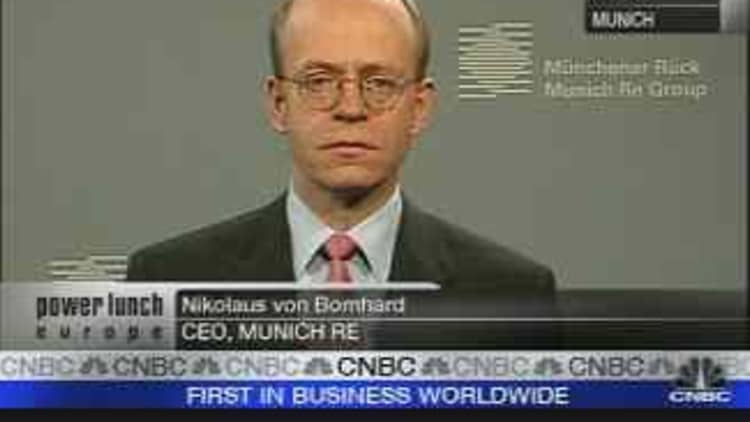German reinsurer Munich Re aims to make 3.4 billion euros ($5 billion) in net profit in 2008, despite ongoing financial market turbulence and falling reinsurance prices, the company said on Monday.
"As a reinsurer, we have good news here as liquidity is not an issue at all for us, actually, for an insurance company and it should never be a problem," Munich Re's CEO Nikolaus von Bomhard told "Power Lunch Europe".
"The liquidity crisis did sort of surprise us as regards to speed and also the seriousness," von Bomhard added. "We feel that the markets will need some time to calm down and it will take at least half a year until we really know what's going on."
Prices and margins in reinsurance were under some pressure, von Bomhard acknowledged, but the company aimed to sustain at least 3 billion euros in annual net profit in the years ahead.
"We took a pretty conservative approach when adding credit risk and market risk (to 2008 outlook)," Von Bombard told "Power Lunch Europe".
Munich Re's 2008 goal is about 500 million euros below the record net profit of 3.9 billion it posted in 2007, which was flattered by real-estate and stock sales as well as a one-off tax gain of 385 million euros.

"Results and outlook are in line with our expectations," said DZ Bank analyst Thorsten Wenzel in a note to clients, in which he confirmed a "buy" recommendation and fair value of 150 euros on the share.
The world's second-biggest reinsurer had already given the key points of its 2007 results last month, one of several companies to bring forward its earnings announcement in an effort to calm investor concerns about exposure to U.S. subprime investments and bond insurers.
Subprime No Worry
Munich Re on Monday repeated that it had about 340 million euros of subprime exposure or less than 0.2 percent of its total investments.
Its write-downs and losses on subprime investments totaled 15 million euros in the fourth quarter and 166 million euros in 2007 as a whole.
"We have no reason for concern," Chief Financial Officer Joerg Schneider told a news conference, referring to subprime.
Munich Re, which makes money by charging insurance company clients for covering part of their risks, posted a 12 percent drop in net profit before minority interests to 589 million euros in the fourth quarter, hit by a sharp fall in investment income, while premiums fell slightly.
Investment income fell by 14.4 percent to 1.636 billion euros in the October-December period, which was rocked by global credit market turmoil.
Shares Less Hit
Munich Re stock has fallen by 7 percent over the past six months, compared with a decline of nearly a fifth among European insurance peers and more than 21 percent at its bigger rival Swiss Re, tarnished by a $1 billion subprime writedown last year.
Munich Re confirmed that it planned to raise its dividend to 5.50 euros per share for 2007 from 4.50 euros paid for 2006.
It has promised to buy back at least 3 billion euros in shares and pay at least 1 billion euros per year in dividends through 2010. It has already completed a 2 billion euro share buyback program started last year.
Von Bomhard said the group's insurance unit ERGO may make small or medium-sized acquisitions this year.
Munich Re has been pushing the expansion of its primary insurance business in Germany and internationally because it is seeing stronger growth than in traditional reinsurance.
The company stated that it considers its primary insurer ERGO to be an integral part of its business.
The company brushed off calls to sell its ERGO unit, saying it expects expansion in the primary insurance market to outpace growth in reinsurance.
"We think that primary insurance will have an easier way to grow because the reinsurance market (is) under some pressure these days," von Bombard told CNBC Europe.
"We think that the strategy of having primary insurance and reinsurance under one roof is the right strategy. It has to do with volatility management, cycle management, it's about synergies and diversification."
-- Reuters contributed to this report

